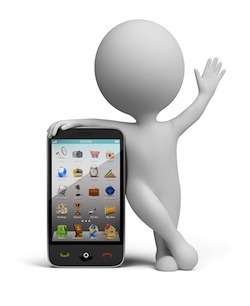A recent study from Four Points by Sheraton shows that of their business travelers, a majority carry three to four devices with them, which are both for business and personal use. While the hotel’s study was aimed at how well they serve business travelers, it offers a different perspective on BYOD risk.
According to Four Points, which is part of the Starwood Hotel & Resorts chain, of the 6,000 guests surveyed, 55% of them said they carry three to four devices with them at all times. Of those, Smartphones are the top device (74%), followed by tablets (65%), and laptops (32%).
 Interestingly, when asked what device is often the first choice on a business trip, nearly seven in 10 respondents (68%) use their tablet more often than their laptop, and accordingly a similar number (69%), if told they could take only one of the two on the road, would choose to travel with their tablet.
Interestingly, when asked what device is often the first choice on a business trip, nearly seven in 10 respondents (68%) use their tablet more often than their laptop, and accordingly a similar number (69%), if told they could take only one of the two on the road, would choose to travel with their tablet.
Consider this; most of the travelers surveyed are likely using a mix of personal devices and ones issued to them at the office. Both however, are sure to contain work related data. Earlier this year at the RSA Security Conference, I spoke with Credant Technologies, a vendor that specializes in data protection.
The discussion focused on the risk posed by lost mobile devices, which is anything from USB drives and smartphones, to laptops and tablets filled with company data. The timing of the meeting wasn’t random, as they had just released the results of a survey focusing on major chain hotels with properties serving the RSA Conference attendees.
Credant included the Four Seasons, Hilton, Holiday Inn, Marriott and the Ritz Carlton in the research, each one a regular haunt for road warriors. At the time, it was reported that more than 2,300 devices, including 1,882 smartphones or tablets, 267 laptops, and 167 USB drives.
Fast forward to July, and a study that focuses on airports found that in the last year, travelers left behind 8,016 mobile devices at seven of the largest airports in the country, including: Chicago O’Hare, Denver International, San Francisco International, Charlotte Douglas, Miami International, Orlando International and Minneapolis/St. Paul.
Again, with Sheraton reporting that their respondents claimed to carry three to four devices, and Credant discovering that losing said devices is almost commonplace, the ides that organizations need some sort of BYOD / Mobile protection policy is clear.
“…companies must be vigilant in securing data wherever it resides. Be it a USB drive, a laptop, a tablet or a smartphone, unsecured data puts companies at risk…,” commented Bob Heard, founder and CEO of Credant Technologies.
The question however, isn’t if such protections and policies are needed, but how to go about implementing them. This isn’t an easy task to tackle.
There is no such thing as a one size fits all solution, so companies need to match their needs and overall business plans to the vendor and product. This means demos, meetings, pitches.
Credant offers data protection that is policy based across the entire enterprise, on any device or platform. You can learn about them here.
McAfee also has a mobile protection platform, with Enterprise Mobility Management. In addition, they also released a new version of their Mobile Security Software. More on McAfee is here.
Sophos also has a mobile protection suite, which covers iPhones, iPads, and Android devices. Details on their offering are here.
AirWatch also offers several mobile security solutions in areas of mobile device management, security, BYOD deployment, and mobile DLP. More in AirWatch’s solutions can be found here.
Lastly, Symantec has a suite of mobile security offerings, which cover nearly every aspect one could imagine when dealing with BYOD. Details on their products are here.
Either way, while BYOD may be overhyped, it’s a legit concern. Workers are trying to keep ahead of the game, and are taking work home with them. They take it on vacation with them, and they will use corporate and personal devices to access it, so it has to be protected. The catch is actually implementing protection that works for everybody.












